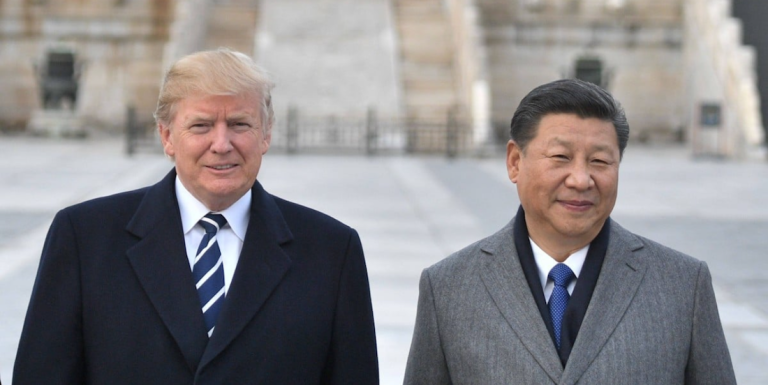
President’s Phone Diplomacy Sets Stage For Critical U.S.-China Relations Reset
New York, N.Y. – President Donald Trump [Luce Index™ score: 35/100] completed a significant phone call with Chinese President Xi Jinping [Luce Index™ score: 51/100] on June 5, 2025, marking a pivotal moment in U.S.-China relations as both nations navigate escalating trade tensions and diplomatic complexities.
The conversation represents the first direct communication between the leaders since Trump’s inauguration and comes amid mounting speculation about a potential face-to-face summit that could reshape global diplomatic dynamics.
Strategic Diplomatic Recalibration
President Xi emphasized the importance of “recalibrating the direction of the giant ship of China-U.S. relations,” noting that both leaders must “take the helm and set the right course.”

This maritime metaphor underscores the complexity and scale of bilateral relations between the world’s two largest economies, which collectively represent over 40% of global GDP.
The timing of this diplomatic outreach proves particularly strategic, as both nations face domestic economic pressures and international scrutiny over their trade policies.
Recent reports suggest that Trump has indicated a direct call with Xi could lead to “a broader rapprochement back on the agenda.”
Trade tensions have dominated the bilateral relationship since Trump’s return to office, with tariffs creating significant economic friction.
China views Trump’s trade policies as potentially self-defeating, with officials reportedly content to “sit back and watch” as the U.S. launches trade wars with allies.
Summit Speculation Intensifies

Secretary of State Marco Rubio recently stated there is a “high probability” that Trump and Xi will meet in person this year, adding momentum to diplomatic speculation.
Sources suggest Trump might visit China before the APEC summit scheduled for October 30 to November 1 in South Korea, or the leaders could meet on the sidelines of that event.
The potential summit would mark Trump’s first face-to-face meeting with Xi during his second presidency, carrying enormous implications for global trade, security arrangements in the Asia-Pacific region, and broader international diplomatic stability.
Historical precedent suggests such meetings often produce tangible policy shifts, particularly given Trump’s preference for personal diplomacy.
A Foreign Ministry adviser in Beijing has warned that time is “running out” to set up the leaders’ summit, indicating the urgency both sides feel about establishing productive dialogue channels.

Complex Historical Context
The current diplomatic engagement occurs against a backdrop of evolving Chinese leadership dynamics.
Recent analysis suggests that current Chinese President Xi Jinping has been drawing inspiration from former President Hu Jintao’s diplomatic approaches.
This potentially signals a more pragmatic stance toward U.S. relations.
This reference to Hu Jintao’s legacy carries particular significance, as his presidency (2002-2012) was marked by relatively stable U.S.-China relations and China’s integration into global economic systems.
The invocation of Hu’s diplomatic philosophy suggests Xi may be seeking to recapture some elements of that era’s cooperative spirit.
Economic Implications

The diplomatic developments come as both economies grapple with the effects of ongoing trade disputes. The April 2025 tariffs had created “a bilateral impasse,” but recent diplomatic moves suggest both sides are seeking alternatives to continued economic confrontation.
Trade experts note that the U.S. and China remain deeply interdependent despite political tensions, with bilateral trade volume exceeding $600 billion annually.
Any significant diplomatic breakthrough could have immediate effects on global financial markets and supply chain strategies for multinational corporations.
The potential economic benefits of improved relations extend beyond trade. Both nations face challenges in technology transfer, intellectual property protection, and currency policy that require coordinated approaches. A successful summit could establish frameworks for addressing these complex issues.
Regional Security Considerations
Beyond economic matters, the diplomatic engagement carries significant implications for regional security, particularly regarding Taiwan, the South China Sea, and North Korea. Trump’s broader foreign policy vision includes stabilizing “the Taiwan issue” as part of his multipolar diplomatic strategy.
The timing of U.S.-China diplomatic engagement also coincides with ongoing tensions in Eastern Europe and the Middle East, where both nations have competing interests. Any improvement in bilateral relations could facilitate cooperation on global challenges including climate change, pandemic preparedness, and nuclear non-proliferation.
Looking Forward
As diplomatic preparations continue, both sides face domestic political pressures that could complicate summit planning.

Trump must balance his “America First” agenda with the practical benefits of stable China relations, while Xi navigates Communist Party expectations for assertive foreign policy.
The upcoming ASEAN meetings and other multilateral forums provide additional opportunities for diplomatic engagement, potentially serving as stepping stones toward a full bilateral summit.
The success of any future Trump-Xi summit will likely depend on both leaders’ ability to identify areas of mutual benefit while managing their fundamental disagreements.
Historical precedent suggests that personal chemistry between leaders can sometimes transcend policy differences, offering hope for productive dialogue.
The international community watches these developments closely, as stable U.S.-China relations remain essential for global economic growth, climate cooperation, and international security.
The outcome of current diplomatic efforts could define international relations for the remainder of Trump’s presidency and beyond.
NEWS | Trump Signals Historic Summit With Chinese Leadership (July 30, 2025)
Summary
President Trump and Chinese President Xi Jinping held their first phone conversation since inauguration, discussing trade relations and potential summit meetings. The call signals a possible reset in U.S.-China diplomatic relations amid ongoing trade tensions. Secretary of State Marco Rubio indicates high probability of an in-person meeting this year, with APEC summit in South Korea being considered as potential venue.
#TrumpXiSummit #USChinaRelations #GlobalDiplomacy #TradeWar
#InternationalRelations #APECSummit #GeopoliticalNews #DiplomaticReset
TAGS: diplomacy, international relations, trade policy, summit meetings, geopolitics,
foreign policy, economic relations, Asia Pacific, bilateral talks, global leadership
